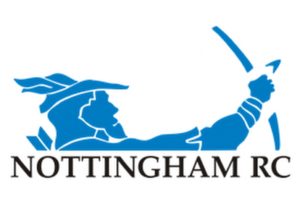Our History.
HISTORY OF NOTTINGHAM BOAT CLUB
Nottingham Boat Club was formed in 1894 by a group of rebels from [the original] Nottingham Rowing Club who insisted on rowing on Sundays. This was against club rules. They refused to apologise to the committee and set up their own club, an event that was depicted by local artist and club member Arthur Spooner. A copy of this painting hangs in the club house – see the Spooner picture article for more details.
The early success of club crews was marked in 1897 when Queen Victoria visited Nottingham and a tray decorated with Boat Club trophies was taken through the streets. In the same year the boathouse was completed on its present site. Boat trips, either up to Clifton or down to Newark were a feature of these early days.
In 1913 the boathouse and boats were partially destroyed by a fire started by suffragettes. Club members attended their next meeting and subjected them to embarassment and indignities.
Many Boat Club members were killed in the Great War and their names are commemorated on a plaque on Trent Bridge. Representatives of the club still attend a short memorial service there on Remembrance Sunday.
In 1930 the club encouraged High Pavement School to begin rowing.
In 1946 Nottingham University Boat Club was set up at the club and moved to its present site in 1951.
The 1950s were a difficult time for the club, but a young membership began to turn the tide. ‘Jazz at the Society Bank’ began on 20th October 1962. Money surged into the club, membership increased, the whole fleet was replaced, and in 1970 the boathouse extension was completed, which housed the eights and new changing and shower facilities. During the 1960’s, 70’s and 80’s most of the popular blues, rock and heavy metal bands played at ‘the Bank’.
By the 1980s the Boat Club was one of the strongest clubs in the country and was producing a steady stream of World Champion and Henley medallists. At Henley Royal Regatta the club won the Diamond Sculls in 1979 and the Wyfold Fours in 1980 and 1982. At Henley Women’s Regatta, Nottingham Boat Club won the Open Coxed Fours in 1992.
1994 saw the club’s Centenary celebrations take place. An eight and a four were purchased and the club had a very successful season on the water.
The club continued to grow its membership and fleet and improve its facilities through the late 1990s and into the 2000s. It also invested in the future of the club by subsidising members on coaching courses to build a large group of coaches, running the sculling school, bringing novices on and raising standards at all levels. The club was given recognition of the standards it had met when it was awarded Clubmark accreditation from Sport England.
The club was the biggest club in Nottingham but with restricted space. For the club to continue to grow it asked the other local clubs if they would consider a merger. The rest is history.
HISTORY OF NOTTINGHAM BRITANNIA ROWING CLUB
The NBRC was formed in 1869, making it the second oldest rowing club in Nottingham. The Club’s first boathouse was in a building that was leased from Mr. A. J. Witty, who was a Nottingham boat builder – this boathouse was actually on the Trent Bridge side of the River Leen, and it was not until 1891 that its first boathouse was built on Meadow Lane, on a site that is now a wharf. At that time finances were low, and to assist the club in establishing a more stable financial position it took what was then an unprecedented step for a sporting organisation and formed a Limited Company, with capital made up of £1 shares that were held by its members.
The origin of the Club’s name is an interesting story. The Club was founded as the result of a bet made between two members of the Nottingham Canoe Club that they could form a rowing club. It is said that the bet was made in the long-lost Britannia Inn that was on Queens Road in Nottingham, from where the new club took its name.
By 1913 the acquisition of new premises had again become a matter of urgency and property belonging to Earl Bentinck was offered to the Club for £1500. As the Club would have had to find a great deal of additional money to equip the new building and also pay ground rent, they declined the offer. However the following year amid a great deal of controversy at the Club they built the present boathouse on the West Bridgford side of the Trent next to the Nottingham Forest Football Club, at a cost of £1300.
Like all rowing clubs over the years, the members struggled to keep their heads above water financially. It was then in the 1960s that they began a venture that not only saved them financially but made them one of the richest clubs in the Midlands.
This was the opening of a discotheque in their boathouse, opening four nights a week to social members who paid an annual subscription of (in old money) two shillings and sixpence – a fee that only entitled them to attend the discotheque. Social membership ballooned to 3500 members, and the Club was able to buy new boats and extend the boathouse.
In 1960 Cliff Booth, who has been both President and Captain of the Club and also one of the Club’s top coaches for many years, had one of his most memorable coaching triumphs when a Britannia pair that he was coaching was selected for the 1960 British Rome Olympic team. Although they didn’t win a medal it was still a great honour to represent their Country.
In 1980 he was awarded the ARA Centenary Medal for his contribution to the sport of rowing. Cliff was also at the forefront of the people who were responsible for the building of the multi-lane rowing course at Holme Pierrepont.
In 1969 the Britannia celebrated its centenary and to mark this occasion the club presented a trophy to Henley Royal Regatta. The Britannia Challenge Cup for club coxed fours is still competed for today.
In 2002 the Britannia eight won the Jackson Trophy for fastest provincial crew at the Head Of The River Race in London, the most prestigious head race in the country. On receiving the trophy, which had been originally presented to the HORR by Nottingham Britannia, they felt that it was looking a bit worse for wear and the committee and members agreed that they should replace it. A new solid silver trophy, worth several thousand pounds, was commissioned, and in 2003 Colin Pritchett, President of the Nottingham Britannia Rowing Club, presented it on behalf of the committee to Andrew Ruddle, Secretary of the HORR.
In June 2006 Nottingham Britannia merged with the Nottingham Boat Club to form the new Nottingham Rowing Club. The merger of these two great Trentside clubs made good financial and rowing sense, and proves that two into one will go.


